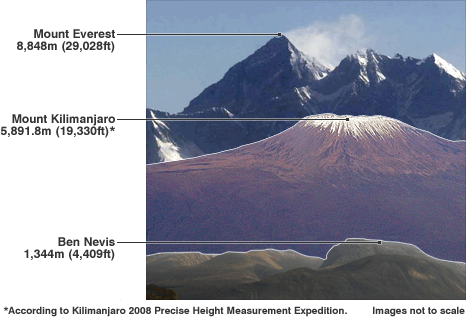The most popular trail for climbing Africa's highest mountain is dismissively known as the "Coca Cola route". It has comfortable huts for tourists to sleep in, food and drink is for sale and the paths are thronged with climbers.
THE ANSWER
THE ANSWER
- Kilimanjaro has very little "technical climbing"
- But altitude sickness is a major problem
- Walking very slowly, having acclimatisation periods and drinking lots of water are key
But while it's fair to say that climbing the nearly 6,000m Kilimanjaro is not akin to climbing Everest or K2, it's still something to be approached with care.
Also Read:- 7 Things You Need to Do to Summit Mount Kilimanjaro
Altitude is the key, who as well as leading trips up the mountain holds the record for the quickest ascent and descent, managing in eight-and-a-half hours what takes the tourists six days.
"It is a very high mountain. Normally people take five or six days. Travelling 1500-2000m in a day is a lot for one person who lives at sea level."
And the consequence of climbing too high, too quickly, is altitude sickness.
Climbers get headaches, suffer vomiting and struggle with their digestive system.
Climbers get headaches, suffer vomiting and struggle with their digestive system.
Image Source
You have got to walk so incredibly slowly; imagine an arthritic 90-year-old walking backwards - that's probably too fast
Of those who make the trip with Mtuy, 60-70% suffer strong symptoms and everybody feels something.
You have got to walk so incredibly slowly; imagine an arthritic 90-year-old walking backwards - that's probably too fast
Of those who make the trip with Mtuy, 60-70% suffer strong symptoms and everybody feels something.
The essence is not bounding ahead enthusiastically, says Jon Garside, training officer of the British Mountaineering Council, who led a party of teenagers up the mountain in 2002.
"It is nothing that a reasonably fit person shouldn't be able to do. The path is a pretty gentle gradient. It is not technically challenging.
"But you get very high very quickly. That affects the body. You have got to walk so incredibly slowly. Imagine an arthritic 90-year-old walking backwards - that's probably too fast.
"It is nothing that a reasonably fit person shouldn't be able to do. The path is a pretty gentle gradient. It is not technically challenging.
"But you get very high very quickly. That affects the body. You have got to walk so incredibly slowly. Imagine an arthritic 90-year-old walking backwards - that's probably too fast.
"If you exert your body at altitude the body will find it really hard to get its breath back."
Some people take aspirin or diamox, a drug to treat the symptoms of altitude sickness, although this is not always recommended. People must always drink plenty of water.
The Comic Relief party are doing the ascent and descent in eight days meaning they are likely to find it a bit easier than the tourists who try to do it in five and struggle to acclimatise.
WHAT'S VITAL?
Some people take aspirin or diamox, a drug to treat the symptoms of altitude sickness, although this is not always recommended. People must always drink plenty of water.
The Comic Relief party are doing the ascent and descent in eight days meaning they are likely to find it a bit easier than the tourists who try to do it in five and struggle to acclimatise.
WHAT'S VITAL?
- Hiking boots
- Cold weather gear
- Large quantities of fluids
- Appropriate food
On Kilimanjaro there's none of what mountaineers call "technical climbing" - moments where you find yourself rummaging for an ice axe as you cling on to an overhang. But despite this many of the tourists fail to complete the ascent.
Mr Mtuy runs expeditions using the Lemosho trail which take seven days up and four days down and says with this gentle programme he manages to achieve a 95% success rate.
And whichever route you're doing whether it's the touristy Marangu route, the more scenic Machame, the longer Lemosho or any of the others the key thing is mental strength.
WHO, WHAT, WHY?
A regular part of the BBC News Magazine, Who, What, Why? aims to answer some of the questions behind the headlines
"No matter how strong you have to be prepared mentally," says Mr Mtuy.
"Sleeping on the ground for five or six days is hard. You need the determination. You have a head ache your body is aching, you are struggling."
And of course if you do make the ascent, as well as the layers of wildly differing vegetation you are guaranteed a spectacular view.
"It is really amazing when you get to the crater rim and you see this lunar landscape. It is a very beautiful mountain to climb," says Mr Garside.
And of course if you do make the ascent, as well as the layers of wildly differing vegetation you are guaranteed a spectacular view.
"It is really amazing when you get to the crater rim and you see this lunar landscape. It is a very beautiful mountain to climb," says Mr Garside.


Yes,Thanks Andy Johnson to Post this brief about Kilimanjaro.Am a tour operator from Tanzania where the Kilimanjaro mountain is found.Apart of all things am looking a tour company to work with in Tanzania as a local/ground a tour operator.For any one interesting kindly email me at info@africanexposure.net my page is http://www.africanexposure.net
ReplyDeleteThanks for the comment :)
Delete